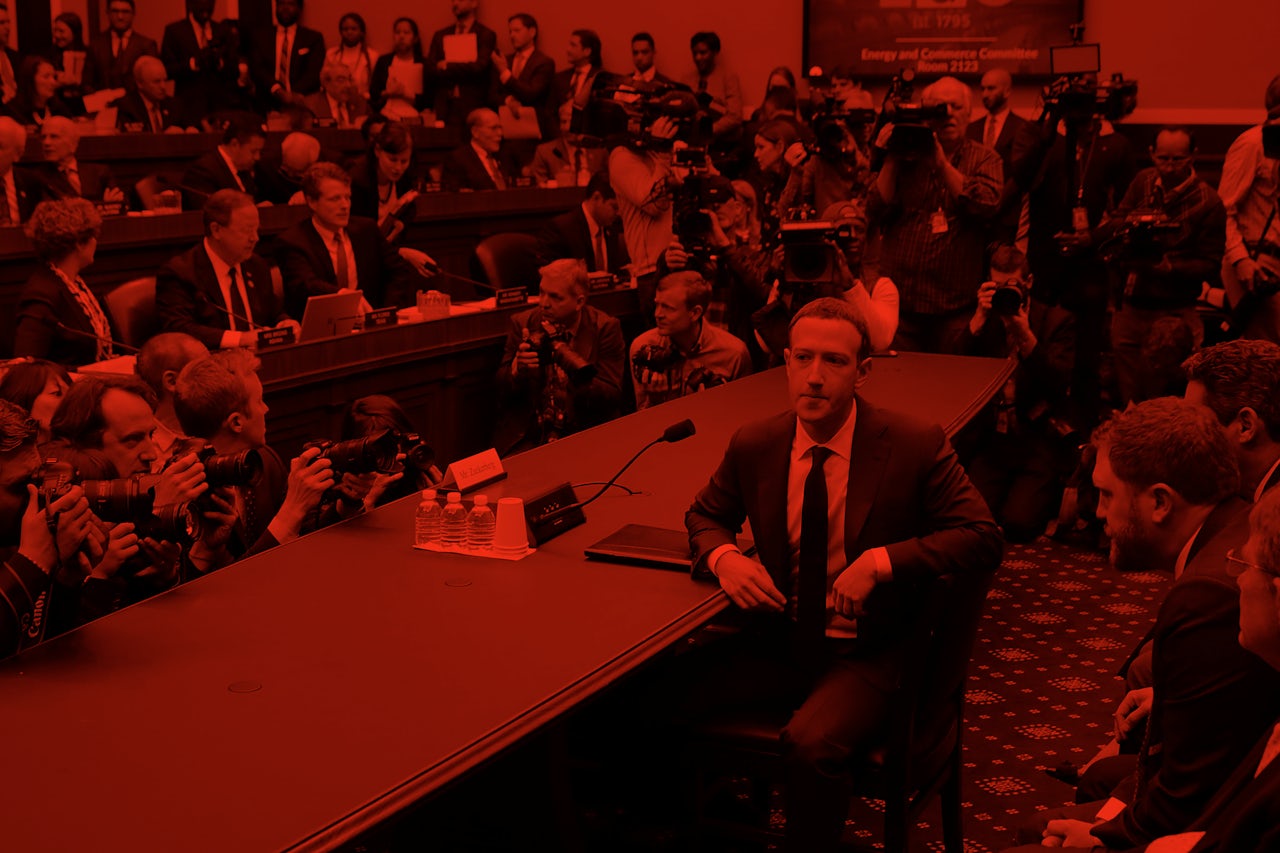Yesterday, Facebook CEO Mark Zuckerberg fielded five hours of frustratingly ineffective questions from the Senate, most of them too basic to get at how Facebook threatens people’s livelihoods. In today’s hearing with the House, the congresspeople were somewhat younger and savvier, but Zuckerberg was still able to take advantage of representatives’ general lack of technical knowledge, tossing out cookie-cutter sound bites wholly irrelevant to the topic at hand. None of the members of Congress questioning Zuckerberg were clear enough on the difference between privacy from each other on Facebook and privacy from Facebook to nail Zuckerberg down. The same happened with Facebook’s tracking across the web outside of Facebook: Congresspeople had heard enough to be concerned, but not enough to recognize when Zuckerberg was squirreling away.
In response to any question about “data” or “content”, Zuckerberg whipped out his two favorite non-answers: Of course, Facebook doesn’t sell any data/All the content that you share on Facebook is yours, and People choose to share data, always steering them away from the matter of what is done with data on the back end to, say, serve ads or market, and back to what privacy users might have from one another. Take this, exchange between Rep. (and House Energy Committee Chairman) Greg Walden and Zuckerberg, which took place somewhere within the first 30 minutes of the hearing:
Rep. Walden
Back in 2012 and 2013 when a lot of this scraping the user and friend data was happening, did it ever cross your mind that you should be communicating more clearly with users about how Facebook is monetizing their data?
I understand that Facebook does not sell user data, per se, in the traditional sense, but it's also just as true that Facebook's user data is probably the most valuable thing about Facebook. In fact, it may be the only truly valuable thing about Facebook. Why wasn't explaining what Facebook does with users' data higher priority for you as a co-founder and now as CEO?
Zuck
Mr. Chairman, you're right that we don't sell any data and I would say that we do try to explain what we do as time goes on. It's a broad system. Every day about 100 billion times a day people come to one of our products whether it's Facebook or Messenger or Instagram or WhatsApp to put in a piece of content, whether it's a photo that they want to share, a message they want to send someone, and every time there's a control right there about who you want to share it with.
Do you want to share it publicly — to broadcast it out to everyone? Do you want to share it with your friends, a specific group of people? Do you want to message it to one person, or a couple of people? That's the most important thing that we do, and I think that in the product that's quite clear.
Despite the fact that Rep. Walden very specifically asks Zuckerberg about the privacy of user data (i.e., the personal information about you Facebook collects and uses to create ads) Zuckerberg’s answer is almost solely in reference to the privacy of user content (i.e., the stuff you post on Facebook). The difference between these two types of data is huge, but Zuckerberg obfuscated at every opportunity.
“I do think that we can do a better job of explaining how advertising works,” he continued, in a brief moment of clarity (before, of course, veering right back off-topic). “There is a common misperception, as you say, that often keeps being reported on, that, for some reason, we sell data. I can't be clearer on this topic: we don't sell data. That's not how advertising works and I do think we can be doing a clearer job explaining that given the misperceptions out there.”
Zuckerberg tried something similar with Rep. Kathy Castor when asked whether Facebook tracks users’ web activity. Though Castor’s questions were specific (e.g. “You are collecting personal information on people who do not even have facebook accounts, isn't that right?” and “You're collecting medical data, correct, on people that are on the internet, whether they're facebook users or not, right?”), Zuckerberg’s answers were so blatantly non-committal (“People choose to share data!”) that she eventually had to resort to shouting “Yes or no?!” over his long-winded non-answers. Even that failed to produce much.
In response to Rep. Frank Pallone’s question — “How can consumers have control over their data when Facebook doesn't have control over the data itself?” — he pivoted to a 2015-era change to the settings which allowed third-party apps to gather data from a user’s friends, which — in addition to being wholly irrelevant to the topic at hand — was quite literally discussed and dismissed as a viable solution by Pallone only moments before. Zuckerberg gave a similar non-answer to Rep. Joe Barton when asked why Facebook collects and sells the personal data of minors, and again to Rep. Doris Matsui in response to her multiple questions regarding data ownership.
Whenever powerful American men appear before Congress, the question is rarely whether they’ll try and conceal the truth, but to what degree. And while phrases like “I do not recall” are practically seared into our nation’s brain as a painstakingly obvious attempt at obfuscation, but the complexities of tech companies have presented endless new opportunities for business leaders to evade responsibility.
